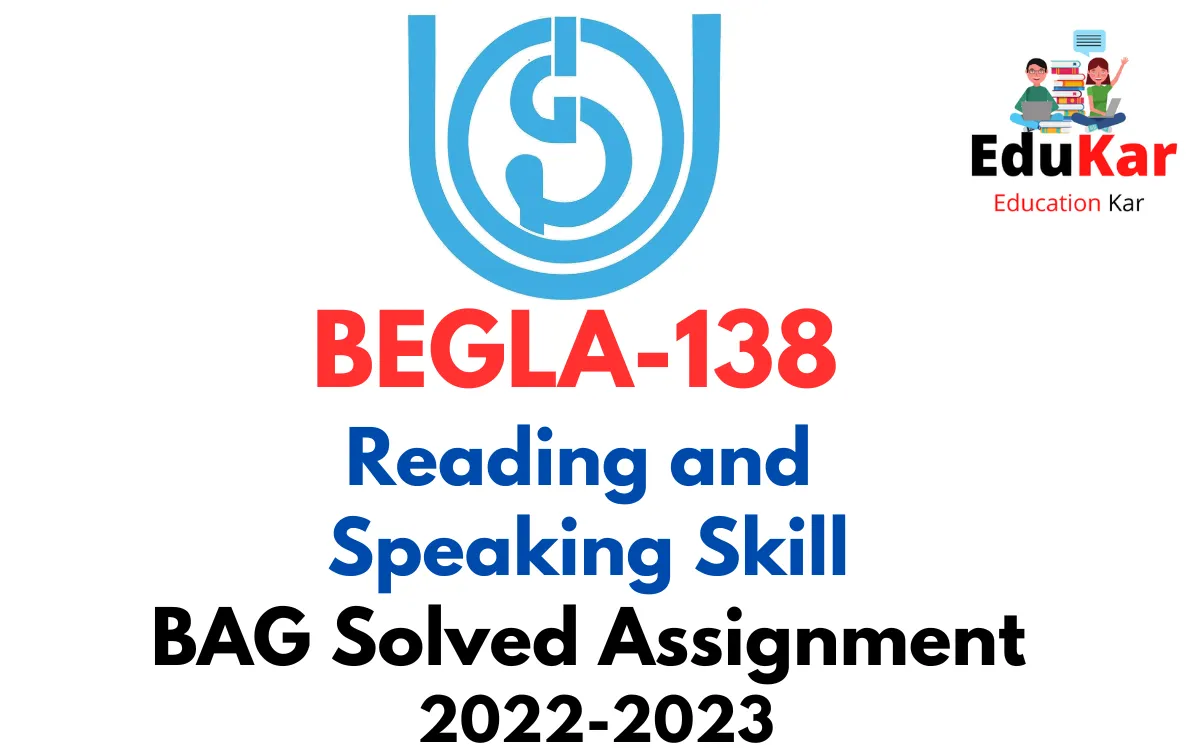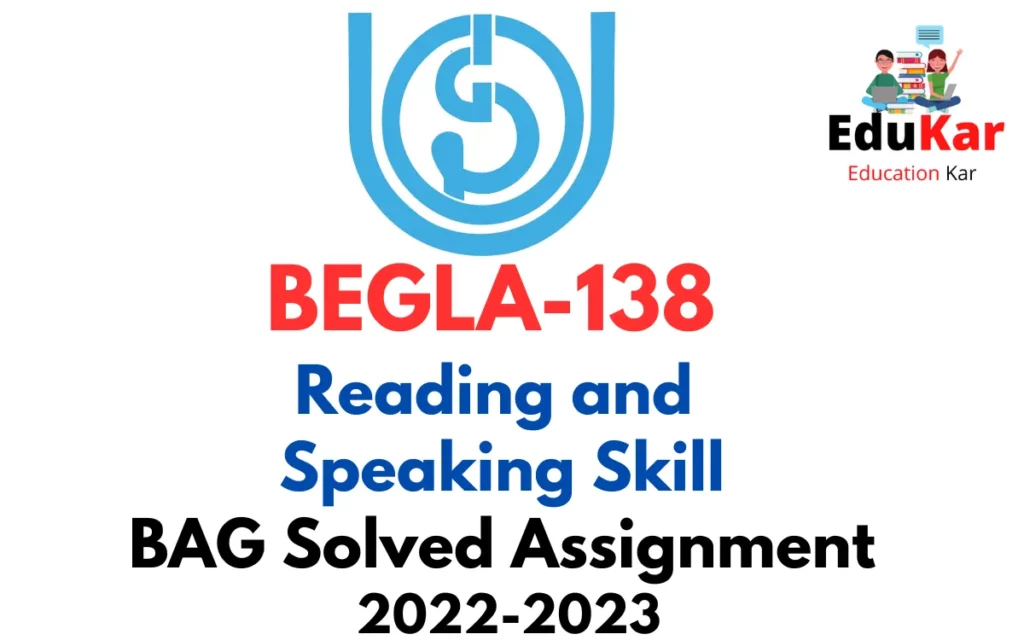
| Title | BEGLA-138: IGNOU BAG Solved Assignment 2022-2023 |
| University | IGNOU |
| Degree | Bachelor Degree Programme |
| Course Code | BEGLA-138 |
| Course Name | Reading and Speaking Skill |
| Programme Name | Bachelor of Arts (General) |
| Programme Code | BAG |
| Total Marks | 100 |
| Year | 2022-2023 |
| Language | English |
| Assignment PDF | Click Here |
| Last Date for Submission of Assignment: | For June Examination: 31st April For December Examination: 30th September |
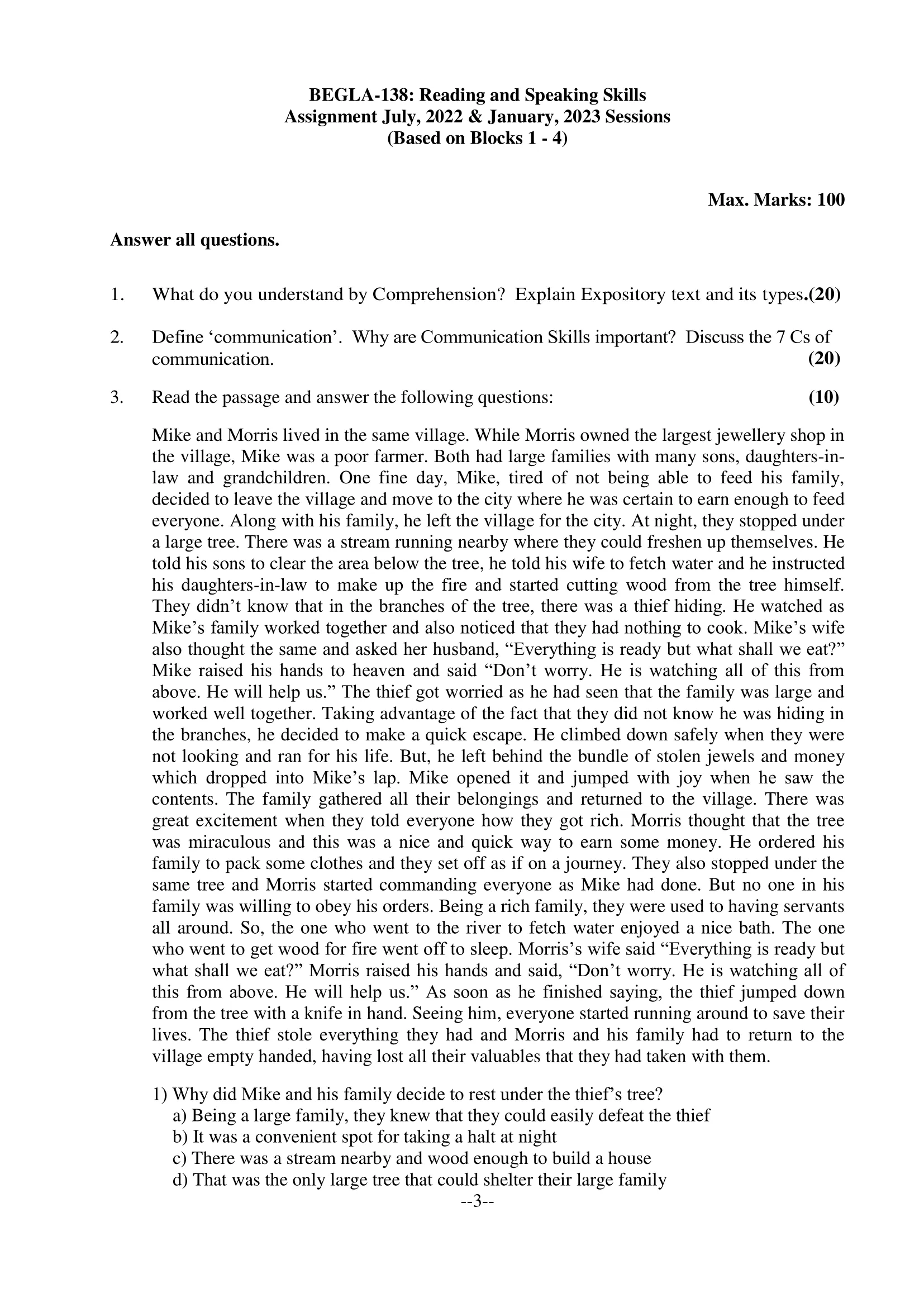
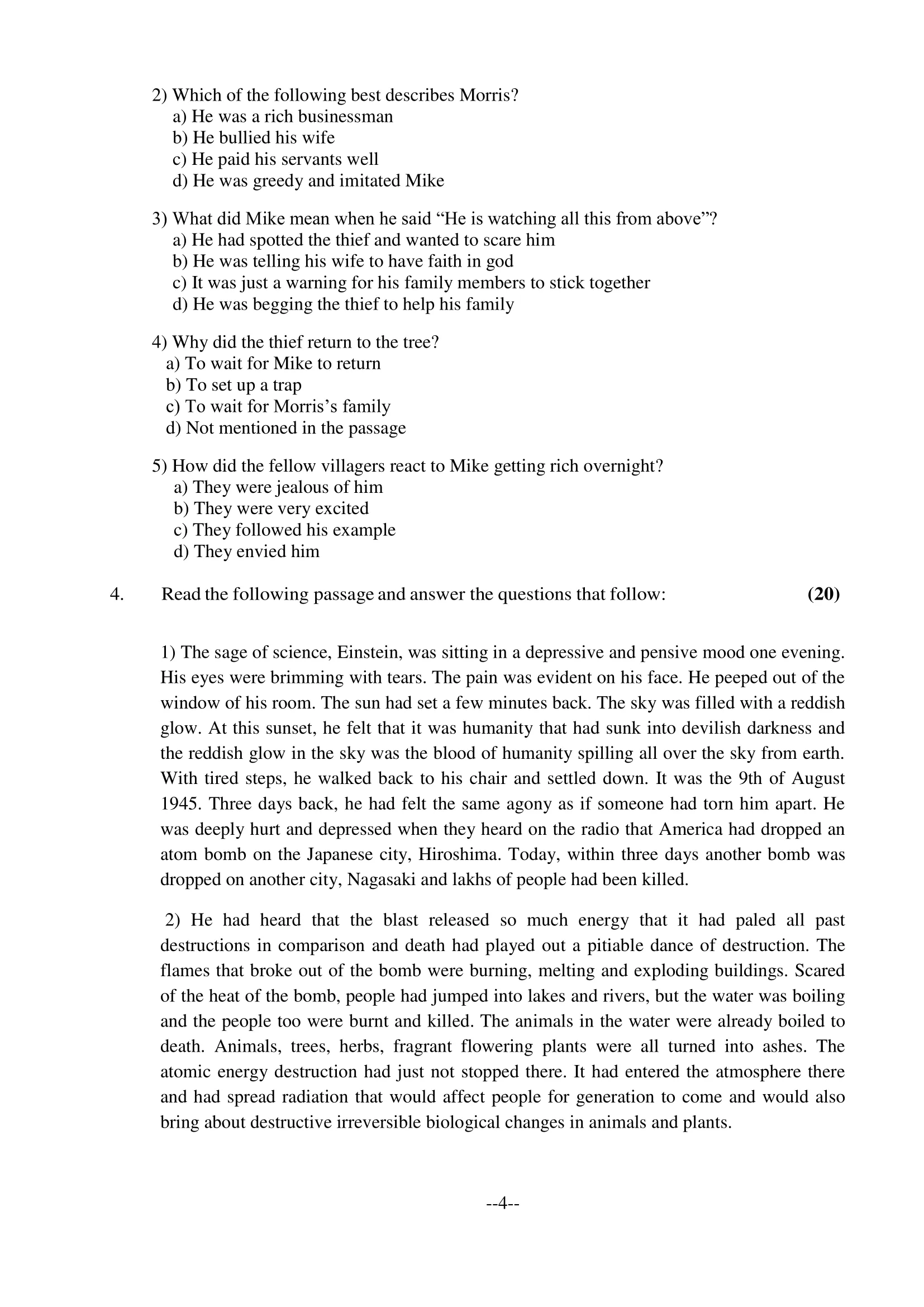
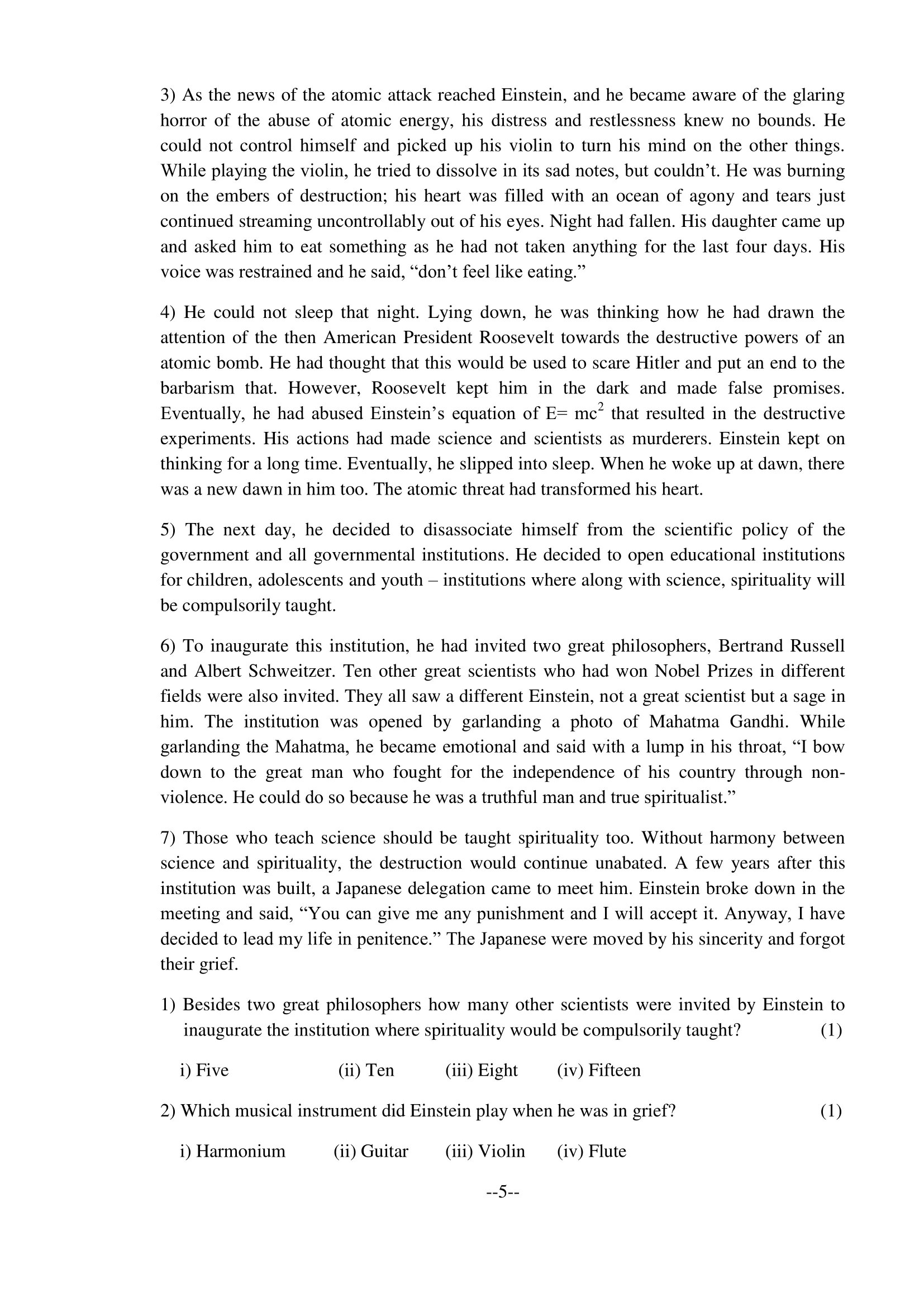
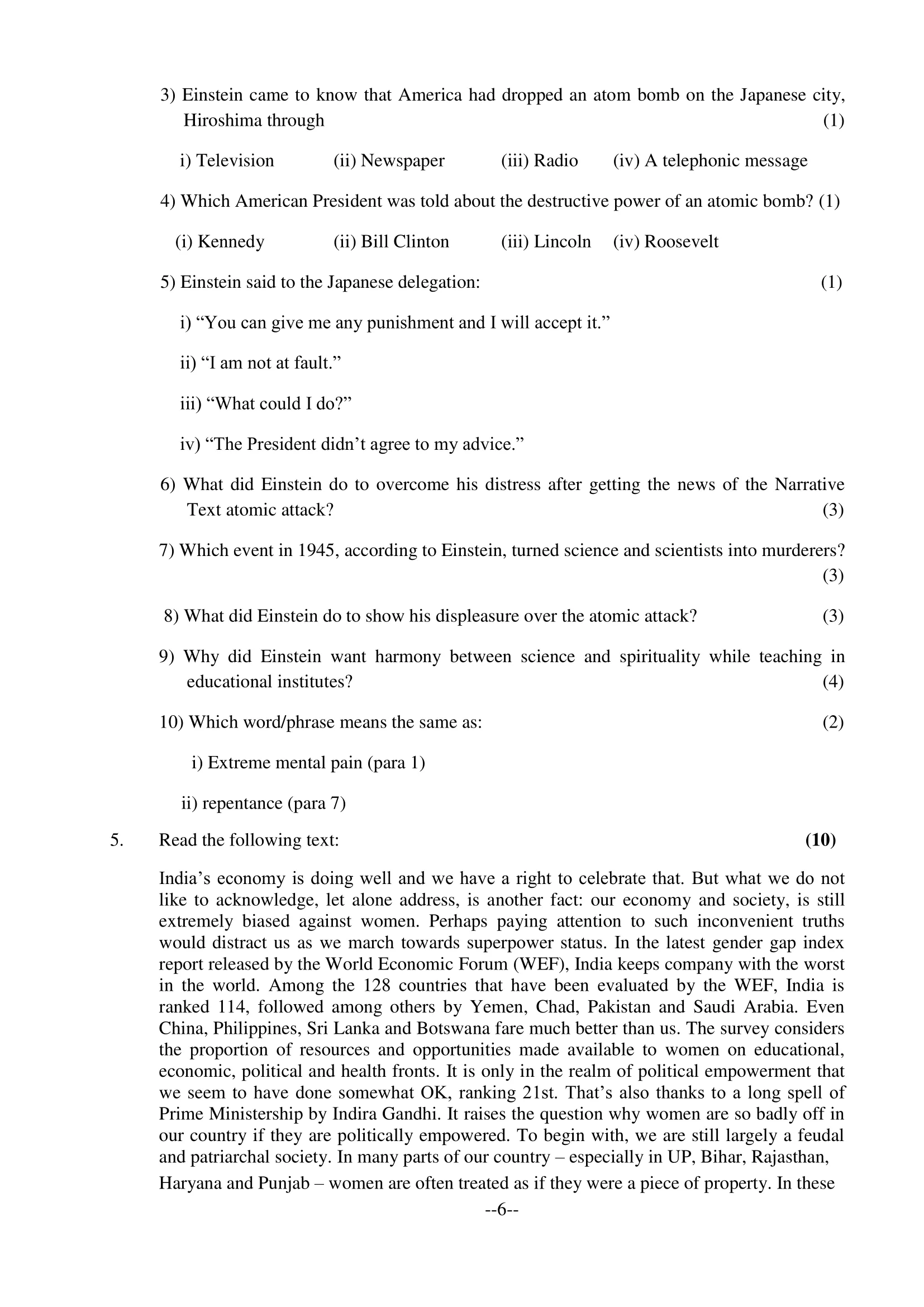
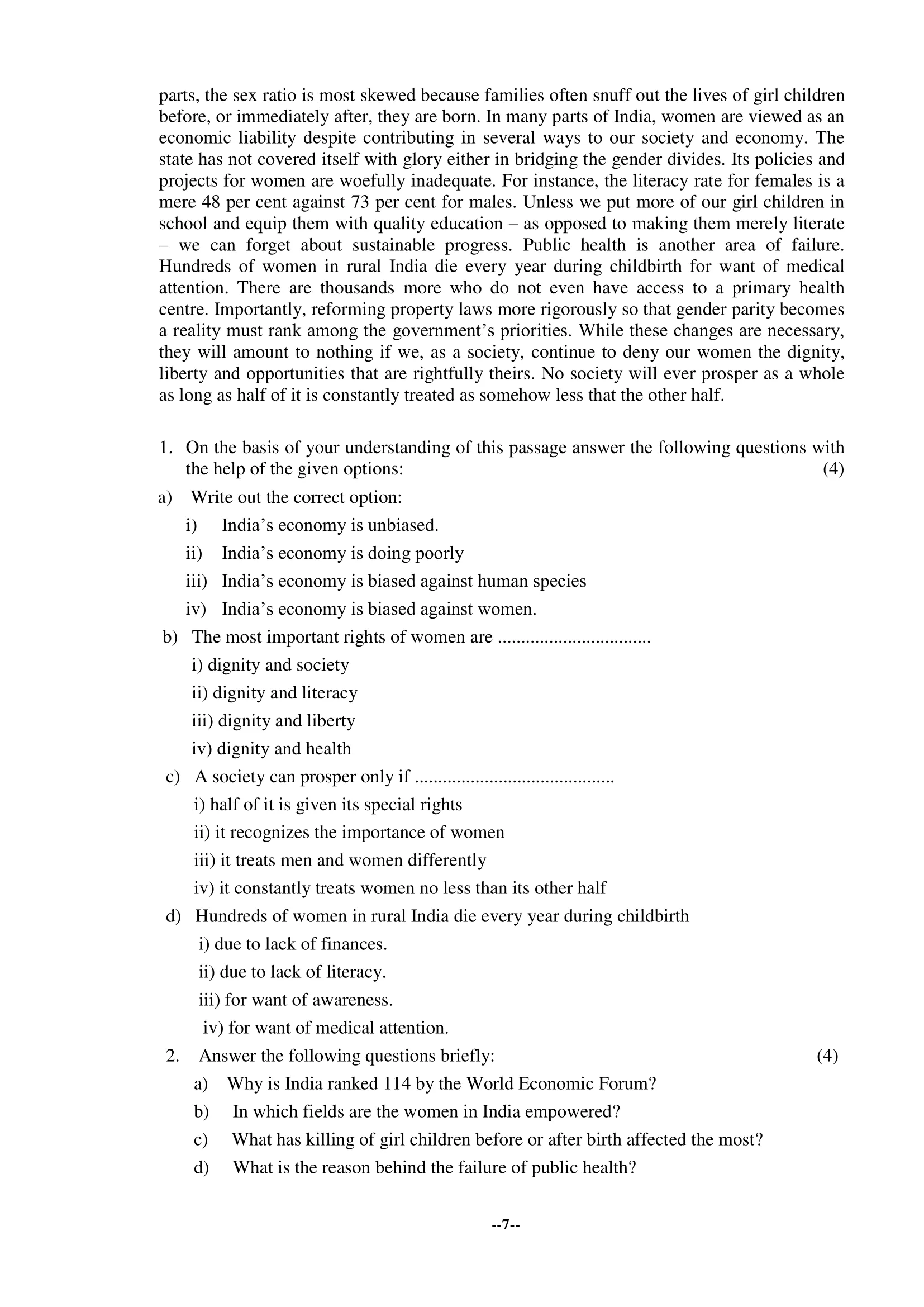
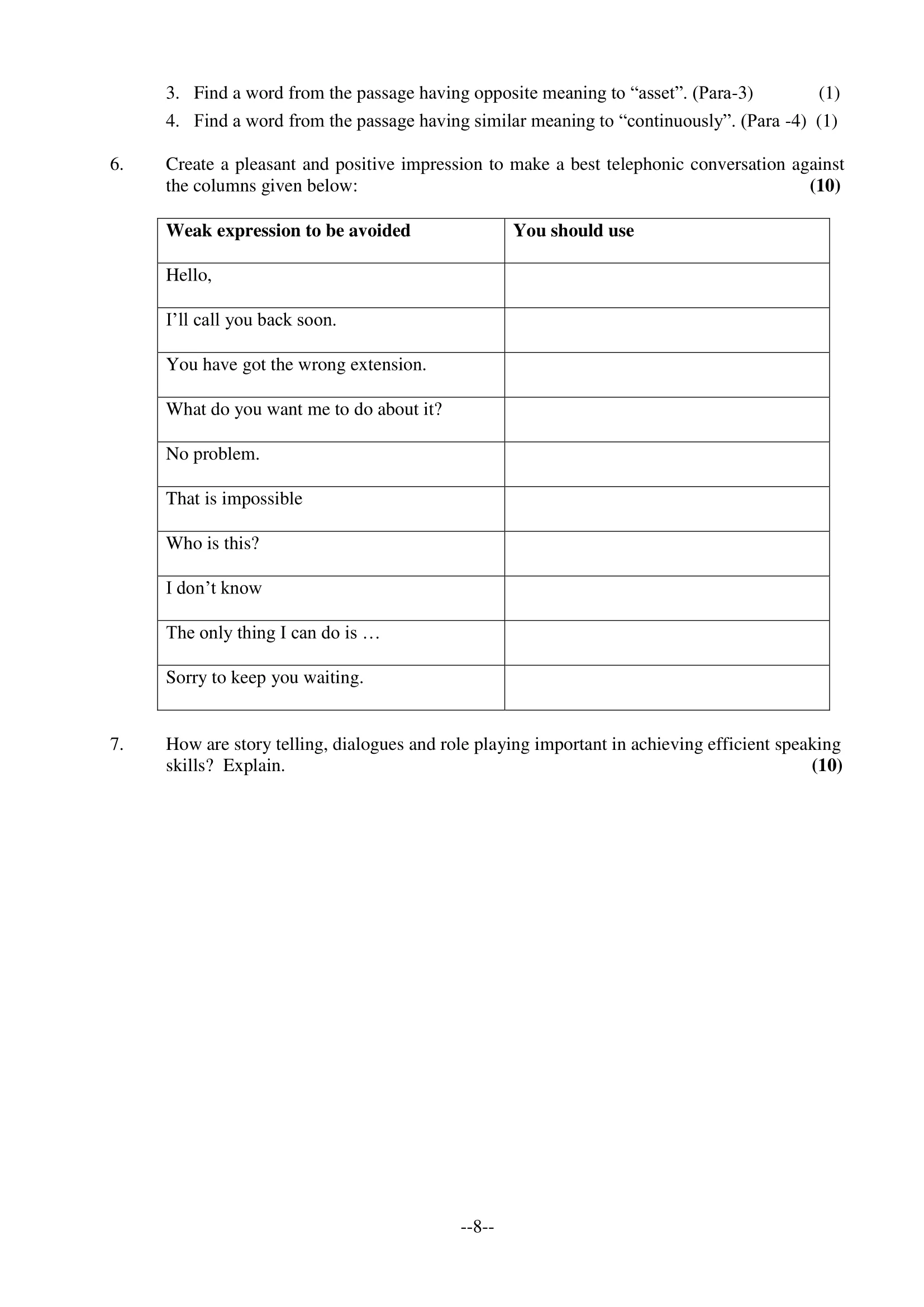
1. What do you understand by Comprehension? Explain Expository text and its types.
Ans: Comprehension refers to the ability to understand and make meaning of written or spoken language. It involves several cognitive processes, including decoding, vocabulary knowledge, background knowledge, inference, and analysis. Comprehension is essential for effective communication, learning, and critical thinking.
Expository text is a type of nonfiction writing that aims to explain or describe a topic, concept, or idea. It presents information in an objective, logical, and organized manner, and its purpose is to educate or inform the reader. Expository text can take many forms, including textbooks, news articles, essays, reports, and manuals.
There are several types of expository text:
- Descriptive: Descriptive text describes a topic, object, or event in detail, using sensory details and vivid language. It aims to create a mental picture in the reader’s mind.
- Sequential: Sequential text presents information in a step-by-step, chronological order. It is often used to explain processes or procedures, such as how to assemble a piece of furniture or how a plant grows.
- Compare/Contrast: Compare/contrast text examines two or more things and discusses their similarities and differences. It is often used to analyze different options or to make a decision.
- Cause/Effect: Cause/effect text explains how one thing leads to another. It discusses the reasons for a particular event or phenomenon and its consequences.
- Problem/Solution: Problem/solution text identifies a problem and presents possible solutions to it. It is often used in persuasive writing to convince the reader to take a particular action.
2. Define ‘communication’. Why are Communication Skills important? Discuss the 7 Cs of communication.
Ans: Communication can be defined as the process of exchanging information, ideas, or messages between individuals or groups. It involves both verbal and nonverbal communication, including language, tone of voice, body language, and other forms of expression.
Communication skills are important for several reasons. Firstly, effective communication helps individuals to express their ideas and opinions clearly, which can lead to better understanding and cooperation between people. Secondly, good communication skills are essential in building and maintaining relationships, both personal and professional. Thirdly, communication skills are crucial for success in the workplace, where effective communication is often required for tasks such as negotiation, teamwork, and leadership.
The 7 Cs of communication are a set of principles that can help individuals to communicate effectively. They are:
- Clarity: Communication should be clear and concise, using language that is easy to understand.
- Conciseness: Communication should be brief and to the point, avoiding unnecessary information or detail.
- Completeness: Communication should include all necessary information, without leaving out important details.
- Correctness: Communication should be accurate and free from errors or mistakes.
- Courtesy: Communication should be polite and respectful, showing consideration for the feelings and opinions of others.
- Consideration: Communication should take into account the needs and interests of the audience, focusing on what is relevant and important to them.
- Concreteness: Communication should be specific and tangible, using examples or evidence to support ideas or arguments.
3. Read the passage and answer the following questions:
1) Why did Mike and his family decide to rest under the thief’s tree?
a) Being a large family, they knew that they could easily defeat the thief.
b) It was a convenient spot for taking a halt at night.
c) There was a stream nearby and wood enough to build a house.
d) That was the only large tree that could shelter their large family.
Ans: b) It was a convenient spot for taking a halt at night.
2) Which of the following best describes Morris?
a) He was a rich businessman.
b) He bullied his wife.
c) He paid his servants well.
d) He was greedy and imitated Mike.
Ans: d) He was greedy and imitated Mike.
3) What did Mike mean when he said “He is watching all this from above”?
a) He had spotted the thief and wanted to scare him.
b) He was telling his wife to have faith in god.
c) It was just a warning for his family members to stick together.
d) He was begging the thief to help his family.
Ans: b) He was telling his wife to have faith in god.
4) Why did the thief return to the tree?
a) To wait for Mike to return.
b) To set up a trap.
c) To wait for Morris’s family.
d) Not mentioned in the passage.
Ans: d) Not mentioned in the passage.
5) How did the fellow villagers react to Mike getting rich overnight?
a) They were jealous of him
b) They were very excited
c) They followed his example
d) They envied him
Ans: b) They were very excited
4. Read the following passage and answer the questions that follow:
1) Besides two great philosophers how many other scientists were invited by Einstein to inaugurate the institution where spirituality would be compulsorily taught?
i) Five (ii) Ten (iii) Eight (iv) Fifteen
Ans: Ten
2) Which musical instrument did Einstein play when he was in grief?
i) Harmonium (ii) Guitar (iii) Violin (iv) Flute
Ans: Violin
3) Einstein came to know that America had dropped an atom bomb on the Japanese city, Hiroshima through.
i) Television (ii) Newspaper (iii) Radio (iv) A telephonic message
Ans: Radio
4) Which American President was told about the destructive power of an atomic bomb?
(i) Kennedy (ii) Bill Clinton (iii) Lincoln (iv) Roosevelt
Ans: Roosevelt
5) Einstein said to the Japanese delegation:
i) “You can give me any punishment and I will accept it.”
ii) “I am not at fault.”
iii) “What could I do?”
iv) “The President didn’t agree to my advice.”
Ans: i) “You can give me any punishment and I will accept it.”
6) What did Einstein do to overcome his distress after getting the news of the Narrative Text atomic attack?
Ans: Einstein played violin to overcome his distress after getting the news of the Narrative Text atomic attack.
7) Which event in 1945, according to Einstein, turned science and scientists into murderers?
Ans: The abuse of Einstein’s equation of E=mc2 that resulted in the destructive experiments is event in 1945, according to Einstein, turned science and scientists into murderers.
8) What did Einstein do to show his displeasure over the atomic attack?
Ans: He decided to disassociate himself from the scientific policy of the government and all Governmental institutions to show his displeasure over the atomic attack.
9) Why did Einstein want harmony between science and spirituality while teaching in educational institutes?
Ans: Einstein want to teach science with spiritually, because without harmony between science and spirituality, the destruction would continue unabated.
10) Which word/phrase means the same as:
i) Extreme mental pain (para 1)
Ans: Depressive and pensive mood.
ii) repentance (para 7)
Ans: Penitence.
5. Read the following text:
1. On the basis of your understanding of this passage answer the following questions with the help of the given options:
a) Write out the correct option:
i) India’s economy is unbiased.
ii) India’s economy is doing poorly
iii) India’s economy is biased against human species
iv) India’s economy is biased against women.
Ans: iv) India’s economy is biased against women.
b) The most important rights of women are ……………………………
i) dignity and society
ii) dignity and literacy
iii) dignity and liberty
iv) dignity and health
Ans: iv) dignity and health
c) A society can prosper only if …………………………………….
i) half of it is given its special rights
ii) it recognizes the importance of women
iii) it treats men and women differently
iv) it constantly treats women no less than its other half
Ans: ii) it recognizes the importance of women
d) Hundreds of women in rural India die every year during childbirth
i) due to lack of finances.
ii) due to lack of literacy.
iii) for want of awareness.
iv) for want of medical attention.
Ans: ii) due to lack of literacy.
3. Answer the following questions briefly:
a) Why is India ranked 114 by the World Economic Forum?
Ans: Because of the unequal proportion of resources and opportunities made available to women on educational, economic, political and health fronts.
b) In which fields are the women in India empowered?
Ans: Politics.
c) What has killing of girl children before or after birth affected the most?
Ans: Sex ratio is most skewed because families often snuff out the lives of girl children before, or immediately after, they are born.
d) What is the reason behind the failure of public health?
Ans: Not providing quality education to girls is the reason behind the failure of public health.
4. Find a word from the passage having opposite meaning to “asset”. (Para-3)
Ans: Property.
5. Find a word from the passage having similar meaning to “continuously”. (Para -4)
Ans: Constantly.
6. Create a pleasant and positive impression to make a best telephonic conversation against the columns given below:
| Weak expression to be avoided | You should use |
|---|---|
| Hello, | What’s up? |
| I’ll call you back soon | I’ll revert to you soon. |
| You have got the wrong extension. | You’ve got the wrong extension |
| What do you want me to do about it? | What is you are expecting from me about it? |
| No problem | ‘No issues’ |
| That is impossible | That’s implausible |
| Who is this? | Who’s there? |
| I don’t know | God knows |
| The only thing I can do is … | It’s in my order |
| Sorry to keep you waiting. | Apologies for making you wait |
7. How are story telling, dialogues and role playing important in achieving efficient speaking skills? Explain.
Ans: Storytelling, dialogue, and role-playing are important tools for developing efficient speaking skills for several reasons.
Firstly, storytelling helps develop the ability to organize and communicate thoughts and ideas in a clear and concise manner. By constructing a narrative with a clear beginning, middle, and end, the storyteller learns how to structure their ideas in a logical and compelling way. This skill is essential for effective public speaking and communication in general.
Secondly, dialogue helps improve conversational skills by providing an opportunity to practice active listening, responding to others, and building rapport. In a dialogue, individuals can practice using appropriate body language, tone of voice, and eye contact, which are all essential components of effective communication.
Finally, role-playing helps individuals develop the confidence and comfort to express themselves in different situations. By playing different characters or roles, individuals can practice speaking in various contexts, such as formal or informal situations, and learn to adapt their speaking style to suit the situation.
How to Download BEGLA-138 Solved Assignment?
You can download it from the www.edukar.in, they have a big database for all the IGNOU solved assignments.
Is the BEGLA-138 Solved Assignment Free?
Yes this is absolutely free to download the solved assignment from www.edukar.in
What is the last submission date for BEGLA-138 Solved Assignment?
For June Examination: 31st April, For December Examination: 30th October
